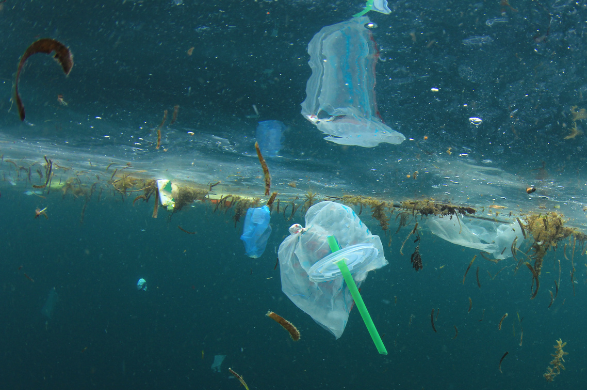Zero Waste Is Essential for Human and Global Health
Pollution isn’t just an environmental problem. Toxic chemicals affect the health of humans, as well as every other species on Earth, each and every day. Every one of us, even newborn babies, carries toxic chemicals in our bodies emitted from dirty manufacturing plants and polluting landfills and incinerators.
Zero Waste strategies help to slash the amount of toxins emitted into our air and water through strategies like Producer Responsibility policies, green purchasing programs, and expanded recycling. The result is fewer toxins in our air, water, soil, and bodies, so that we may all lead healthier lives.
Zero Waste Demands Safer Products
Product redesign is a fundamental principle of Zero Waste. Products and packaging should be designed to be reused, recycled, and composted—and they should be designed to minimize or eliminate the use of toxic materials, as well. Producer Responsibility policies and green purchasing programs motivate manufacturers to adopt these design ethics.
Zero Waste also embraces the Precautionary Principle, which means a chemical should be proven safe before being put into use, rather than removed from use once it’s proven harmful.
Zero Waste promotes safer products that protect our health through:
- Purchasing policies that prioritize nontoxic products and packaging.
- Bans and fees on products that are known to cause health problems, such as polystyrene packaging.
- Policies like REACH that phase out the use of heavy metals in electronics and other products.
- Reducing the use of disposable plastics when possible, particularly those using chemicals like phthalates and bisphenol-A (BPA).
Zero Waste Reduces Plastic Pollution in Our Oceans
Imagine five grocery bags filled with plastic on every foot of coastline around the globe. That’s how much plastic trash ends up in our oceans every year, a staggering 8 million metric tons. Scientists are only beginning to understand how this plastic affects both our marine life and our human food supply. Not only does plastic pollution kill birds and mammals, but it also increases the amounts of toxic substances like PCBs (polychlorinated biphenyls) and pesticides ingested first by fish and later by people.
In the next 10 years, the problem will double unless we figure out a different way. Zero Waste strategies are a key part of the solution, including minimizing the use of disposable plastics, requiring manufacturers to design products and packaging that can be easily recycled, and investing in more facilities and programs to recycle plastics.
Zero Waste Saves Energy and Protects Human and Ecosystem Health
Burning fossil fuels to create energy causes climate change and pollutes our air and water. When we use less fossil fuel–generated energy, we create less pollution. Recycling is one of the easiest and simplest ways to save energy and reduce air and water pollution. For example, recycled paper reduces energy use by 31% and reduces wastewater by 53%.
When we reduce air and water pollution, we reduce human health risks from respiratory disease and cancer, and we improve ecosystem health as well by reducing acid rain and the excessive nutrient buildup in our waterways (eutrophication). Getting to 75% recycling in the US by 2030 would reduce:
- Toxic emissions by 25%
- Respiratory emissions by 45%
- Eutrophication emissions by 60%
- Carcinogenic emissions by 70%
- Acidification emissions by 80%
- Ecosystem toxic emissions by 90%
Zero Waste Avoids Health Impacts from Polluting Landfills and Incinerators
Pollution doesn’t just come from how we manufacture products. Landfills and incinerators spew toxic chemicals into our air and water, too.
Even the EPA admits that all landfills will eventually leak toxic leachate, or “garbage juice,” that carries heavy metals, organic and inorganic pollutants, and other toxins. Leachate can contaminate groundwater and a community’s water supply, posing serious health threats to the local population, as well as burdening communities with a massive clean-up bill for decades to come.
Landfills also emit hazardous air pollutants such as mercury, benzene, toluene, and chloroform. Long-term exposure can impact the health of nearby residents.
Incinerators spew toxic chemicals known to cause cancer, respiratory problems, and disrupt the endocrine system. These are some of the most dangerous substances on the planet—they are persistent (meaning they don’t break down in the environment), bioaccumulative (meaning they build up in bodies), and toxic.
Compared to coal-fired power plants, trash incinerators release 28 times as many dioxins, 2.5 times as much carbon dioxide (CO2), 2 times as much carbon monoxide, 3 times as many nitrogen oxides, 6–14 times as much mercury, nearly 6 times as much lead, and 70% more sulfur dioxide to produce the same amount of energy.
We can prevent these impacts by eliminating the very concept of trash, and investing in resource recovery facilities instead of landfills and incinerators.
Zero Waste Supports Environmental Justice
Trash incinerators, oil refineries, power plants, chemical manufacturing facilities, landfills, and other polluting industrial facilities are disproportionately located in BIPOC and low-income neighborhoods. The result? Higher levels of disease and a lower quality of life in these communities.
Zero Waste means environmental justice for these communities by reducing manufacturing emissions, substituting safer products, and avoiding disposal emissions. Discover how Zero Waste supports social justice for people around the world.
























